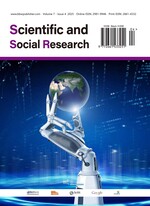Abstract
Against the backdrop of a new round of scientific and technological revolution and industrial transformation, the contradiction between “employment difficulty” among college students and “labor shortage” in enterprises reflects the problem that university education and teaching lag behind industry development and market changes. This paper deeply analyzes the causes of the low fit between talents and jobs in light of the actual situation of the authors’ university, proposes to update the talent training objectives to “integration and innovation, professional proficiency with multiple skills, adaptability to changes, and comprehensiveness”, and presents the main countermeasures to improve the fit between the curriculum system, knowledge and skills, and job requirements. Through the reform practice of curriculum system construction and disciplinary self-renewal in pilot majors, this paper explores a new model for cultivating innovative and application-oriented talents that meets the needs of innovation-driven development and high-quality full employment.
References
Jiao JY, 2023, Notice of the Ministry of Education on Doing a Good Job in the Employment and Entrepreneurship of Graduates from National Regular Institutions of Higher Education in the Class of 2025. The Official Website of the Ministry of Education of the People’s Republic of China.
Zhang HH, Xu LH, Wu QR, 2024, The “Involution” of College Students’ Employment: Manifestations, Mechanisms, and Countermeasures. Journal of Henan Institute of Science and Technology, 44(12): 64–71.
Shi CL, 2025, Research on the Matching of Supply and Demand of Accounting Talents in the Digital Economy Era. Finance and Accounting Monthly, 46(3): 67–73.
Zheng GZ, 2024, The Historical Logic, Theoretical Logic, and Realization Path of New-Quality Productive Forces Empowering Higher Education. Journal of Higher Education, 10(36): 5–9 + 13.
Wu ZY, Guo H, 2025, The Realistic Situation, Practical Logic, and Optimization Path of the Adjustment of the Undergraduate Major Structure in China: Analysis of the Professional Adjustment Actions of Universities from 2014 to 2024. Higher Education Management, 2025(2): 101–112.
Yu Y, Wen HF, Fu WD, 2025, The Modernization of Education in Private Application-Oriented Universities: School-Running Logic, Core Issues, and Reform Strategies. Journal of Higher Education, 11(3): 85–94.
Zhang LR, Xu XH, 2024, The Realistic Dilemmas, Reform Priorities, and Optimization Strategies of College Students’ Career Planning Education. Journal of Wuhan Polytechnic, 23(6): 76–81.
Zhang L, Zhao ZR, 2025, Research on the Reform and Practical Exploration of the Teaching Model of “Promoting Teaching through Competitions” for the Course “Fundamentals of College Students’ Innovation and Entrepreneurship” in Universities. Journal of Liaoning Agricultural Technical College, 27(1): 65–68.
Xu X, Zhu SL, Gao H, 2025, Research on the Effective Model of Innovation and Entrepreneurship Education for Engineering College Students. University Education, 2025(2): 132–139.
Liu Y, Han DB, Gong WD, 2025, Research on the Coping Strategies for College Students’ Employment-Related Anxiety in the New Era. Modern Vocational Education, 2025(3): 41–44.
Wang L, 2020, Research on the Employment-Related Psychological Misunderstandings and Coping Strategies of College Students in Private Universities. Popular Literature and Art, 2020(1): 237–238.
Liu PE, Gao J, 2024, Digital Economy Empowering High-Quality Full Employment: Internal Logic, Action Mechanism, and Optimization Path. Journal of North China University of Water Resources and Electric Power (Social Science Edition), 40(5): 1–9.
